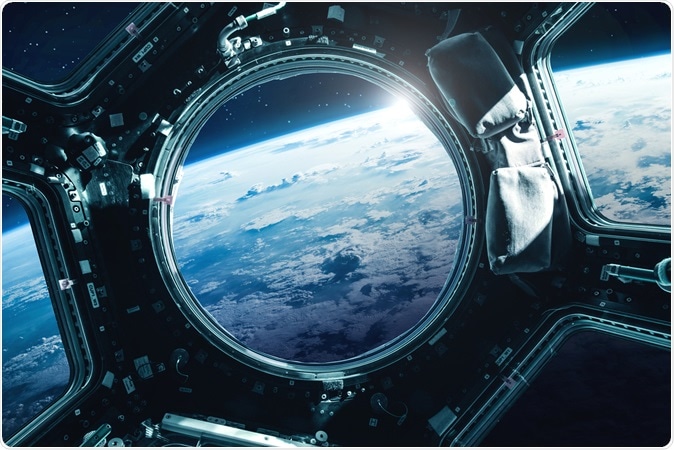Researchers have found that life aboard the International Space Station (ISS) can alter 'super bugs'.
Researchers and microbiologists at the Jet Propulsion Laboratory NASA, had found that there were five different types of Enterobacter present in the toilets and exercise areas on the ISS.
Earlier studies had shown that stay in space altered the bugs in ways and caused them to be “supercharged” as they adapted to the new environment in the space. This led to mutations in the microbes and altered them. In fact a particular bacteria was found to undergo over a dozen mutations when in space and this enhanced their capacity to multiply.

View from ISS. Image Credit: Dima Zel / NASA / Shutterstock
These bacteria formed biofilms on the equipment and the growth of the biofilms were noted to be faster than growth of similar biofilms on earth. This signified the rapid multiplication of these bacteria.
Dr. Nitin Singh, first author of the study said, “Given the multi-drug resistance results for these ISS genomes and the increased chance of pathogenicity we have identified, these species potentially pose important health considerations for future missions…However, it is important to understand that the strains found on the ISS were not virulent, which means they are not an active threat to human health, but something to be monitored.”
Computer modelling and simulations however show that these altered bacteria have a 79 percent chance of becoming virulent and causing human disease. On earth these bacteria develop resistance to the antibiotics and can infect only those with a compromised immunity. It may not be so in space, the team explains because they have 112 genes in common with the pathogenic bacteria on earth.
These space Enterobacter strains were found to be resistant to antibiotics such as cefazolin, cefoxitin, oxacillin, penicillin and rifampin and others.
The JPL routinely analyses the microbes from the space stations to check if they could harm the astronauts in any way or affect the sensitive equipment. Microbiologist Kasthuri Venkateswaran in a statement said, “To show which species of the bacteria were present on the ISS, we used various methods to characterise their genomes in detail. We revealed that genomes of the five ISS Enterobacter strains were genetically most similar to three strains newly found on Earth.” She added, “These three strains belonged to one species of the bacteria, called Enterobacter bugandensis, which had been found to cause disease in neonates and a compromised patient, who were admitted to three different hospitals (in east Africa, Washington state and Colorado).”
These samples were from 2015. Venkateswaran said, “Whether or not an opportunistic pathogen like E. bugandensis causes disease and how much of a threat it is, depends on a variety of factors, including environmental ones…Further in vivo studies are needed to discern the impact that conditions on the ISS, such as microgravity, other space, and spacecraft-related factors, may have on pathogenicity and virulence.”